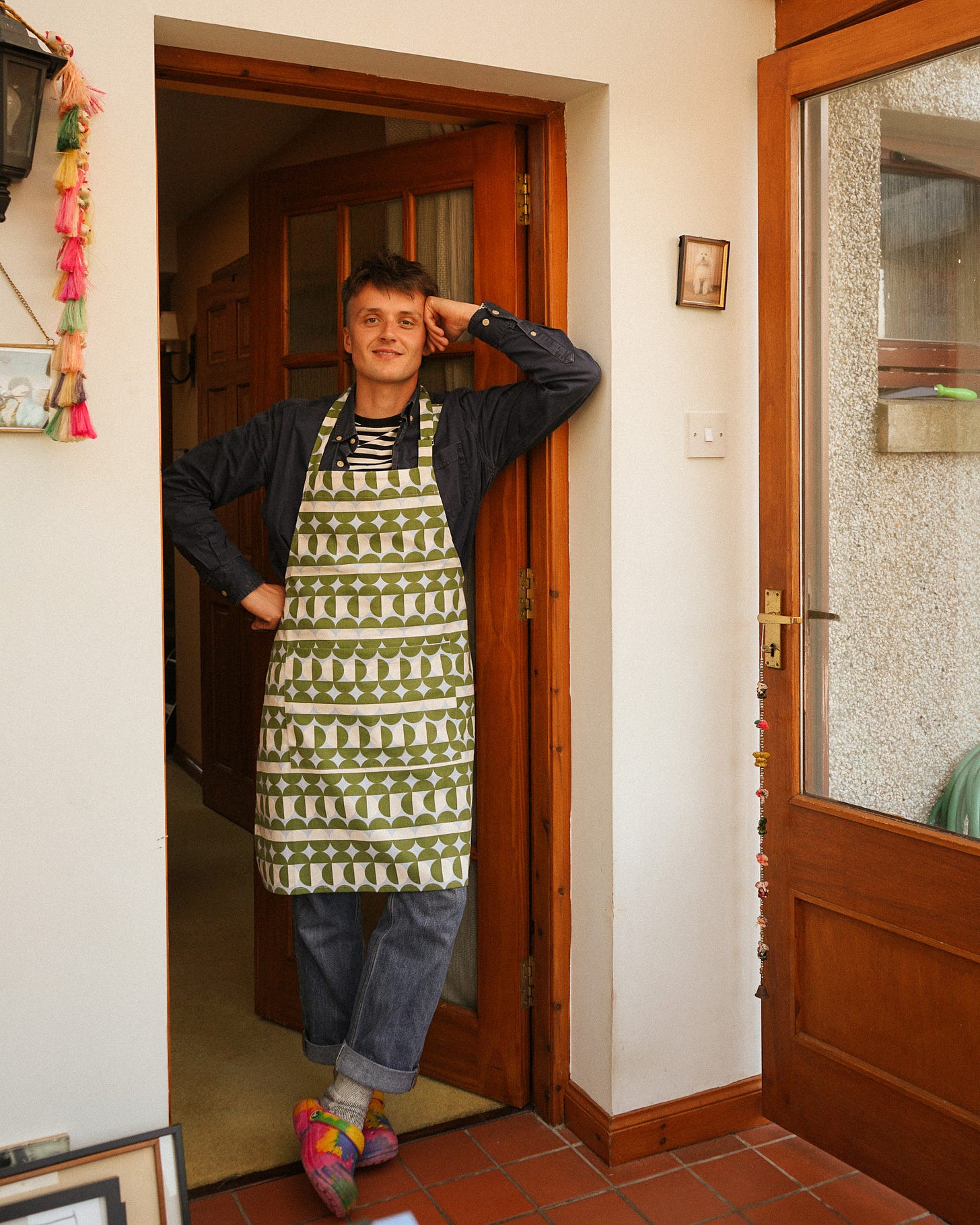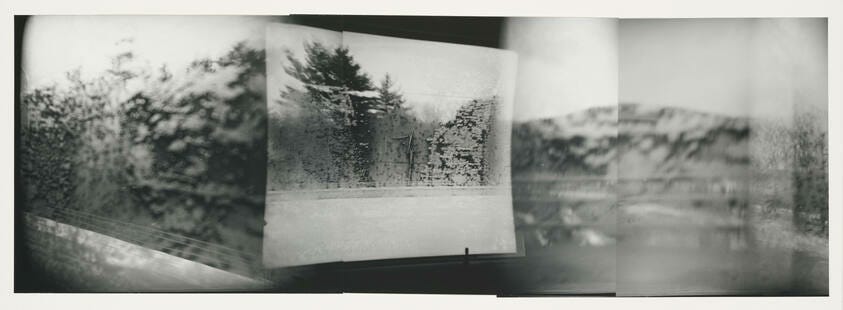Make Your Home
Notes on home and belonging.

As I sit at my desk writing this onto my laptop, the lamp beside me warms me like a fire. In the distance I can hear my dog breathing deep as he sleeps. The air climbs through the window next to me and greets me with a sharp but kind affection. I feel like the seed is finally starting to grow. In time, I will bloom in colour and splendour.
I’ve moved house. That sounds better than I’ve moved home. It also sounds more true. It wasn’t just a case of wake up and move out in one day. It takes weeks and is a total upheaval. Moving can be a sudden jolt of trauma. Seeing your life fold away into small boxes, handling and transporting objects carefully in your hands like organs dissected from a body. I moved because I wanted to, I have that luxury. Though at times I’ve told myself that I needed to just as much as I wanted to. The cold in the apartment began to get too cold. The damp just a little too damp. The view too familiar.
As I began to filter the news of my moving to those around me, a friend signed off her reply with “go, make your home”. Until now, I’ve always found my home around other people. People who’s thoughts and opinions decorated my walls. Their arms were the door I chose to walk through. Forever revolving. Somewhere along the way I told myself that home is a place you find. It hadn’t occurred to me that it could be a place you could make.
For the majority of my life I have been planting myself into other peoples lives and calling it home, living there for years and in other cases just for the night. I spent over 10 years living in London and not one single day of it did I ever call that city home. I told myself he was home, and for 7 years he was. The problem with attaching yourself to a person and calling them home is that the moment they up and leave, they take your home with them. Leaving you standing alone in the echoes and foundations of a former tower of familiarity. What next? Go home? How? Where is home? The absence of other makes way with opportunity for self.

Somewhere along the way, I moved out of myself and into another. In the last 4 years, I have spent my nights and days working to find myself again. Playing with this very real and plain idea that above anywhere, come home to yourself, everyday. Nobel Prize winning Poet Derek Walcott paints this reality better than I could, when, in Love After Love (one of my favourite poems of all time) he writes:
The time will come
when, with elation,
you will greet yourself arriving
at your own door, in your own mirror,
and each will smile at the other’s welcome,
and say, sit here. Eat.
You will love again the stranger who was your self.
Give wine. Give bread. Give back your heart
to itself, to the stranger who has loved youall your life, whom you ignored
for another, who knows you by heart.
Take down the love letters from the bookshelf,the photographs, the desperate notes,
peel your own image from the mirror.
Sit. Feast on your life.- Derek Walcott, Love After Love. Collected Poems 1948 - 1984
When I first read those words from Walcott about 11 years ago (I remember it vividly), I could only wonder what that could feel like, to come back to oneself in such a way. I couldn’t contemplate a reality where one day I would actually greet myself, peel my image from my own mirror, and most longingly - feast on my life. But now, in the echo chamber of heartbreak and after many miles and fields of reflection, I am beginning to arrive at the reality.
Coming home to oneself is also noted by Maya Angelou in her 2008 collection of short writings Letter To My Daughter, where she writes “We may act sophisticated and worldly but I believe we feel safest when we go inside ourselves and find home, a place where we belong and maybe the only place we really do”.
The essence of ‘Home’ is aligned with the sentiment of ‘Place’. Sometimes I think back to being 11 years old and smelling the freshly cut grass at the park near the estate I grew up on. The memory of it, the vivid potency of the smell and the burning of the sun feels as much like home now as it did then. The places we call home can be just as much of an internal landscape as they can be external.

Now that I’ve let home into my life in so many ways. A constellation of them open up in front of me. The gherkin in the burger - home. The glowing of the traffic lights in the dark December night - home. A bird sitting on the window sill opposite as I write this - home. A call from mum when I didn’t know I needed it - home.
The threat of home is very real to those desperate to seek a safer one. In the increasingly difficult world we live in, otherness and division have become landlords of hope. It shouldn’t be a privilege to be able to hope. To have hope should be just as normal as it is to go to sleep or to be human, or to HAVE A SAFE PLACE TO LIVE AND TO CALL HOME. Hope is part of the human condition. We all hope to feel safe, to feel home. We hope to see people we enjoy again. We hope that we do things properly. We hope that we are doing enough (we rarely are).
It is inadmissable that for some, even to hope for a better home is subject to risk and hatred, and to seek it is fraught with danger and unacceptable death.
In a wider sense, there is one mutual home. Planet Earth. I find it to be a strange planet. Occasionally full of wonder and kindness, and other times riddled with hatred and war. But home it is. No more mine than it is yours or theirs. People in power and positions of privilege spend a lot of their time drawing the lines of division in an ever terrifying attempt to “claim what is theirs”. A monopoly. A sick game of who owns more and who owns none at all. It can sometimes feel like you don’t really belong until you own something. If only that kind of implication was applied to responsibility, hegemony and privilege.
I am privileged to have a house I can make into a home. Or to sit in a chair that is comfortable enough to allow me to spend time drifting off to memories of home. Even those memories of home are part of my privilege. As I write this from my home. I extend my thoughts to those most in search of one, to have the freedom and the right to make their own. To sit in comfortable chairs, opposite people they love and enjoy - without fear.
Moments before being transported back to her reality, a new but familiar reality. Dorothy famously clicked her sparkly red heels together and uttered the words “There’s no place like Home”. With every home you make, the newness is often filtered in some kind of familiarity. Furniture moves with you and with it the memories of the friends who once sat around that table, the memories of a grandparent who once sat in that chair. If there’s truly no place like home, then perhaps there’s no place at all. Or at least no one place. Maybe life is full of places to make yourself at home. If you are afforded the safety to do so.
Unfamiliar Comforts is an honest attempt at exploring life, arts and creativity. Subscription is free. If you enjoy what you read here then please consider subscribing to further releases, direct to your inbox. If you want to support the publication of further, there is an option to join or upgrade with a paid subscription. Any and all support in helping to make Unfamiliar Comforts happen is gratefully received - Cameron




It’s so nice to read this, Cameron! I’m happy that you’ve found the home. Greetings from Romania! I hope Sid is well.
Cam, that is beautifully written, I smiled because I can imagine you sitting writing this, you have so much talent. I’m very proud of you. X